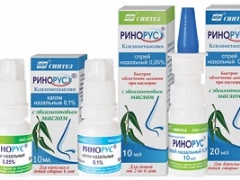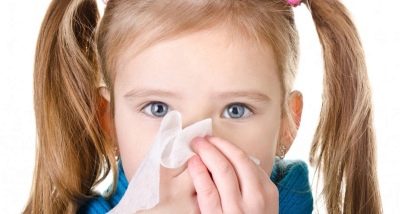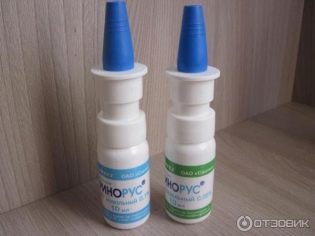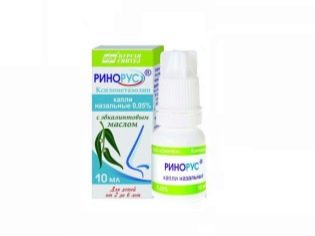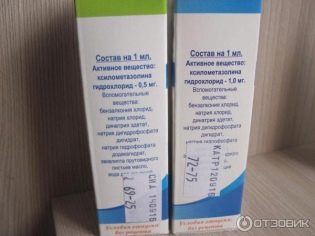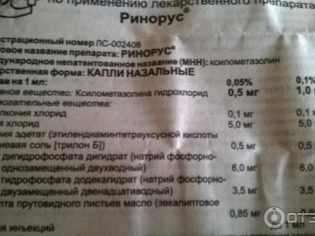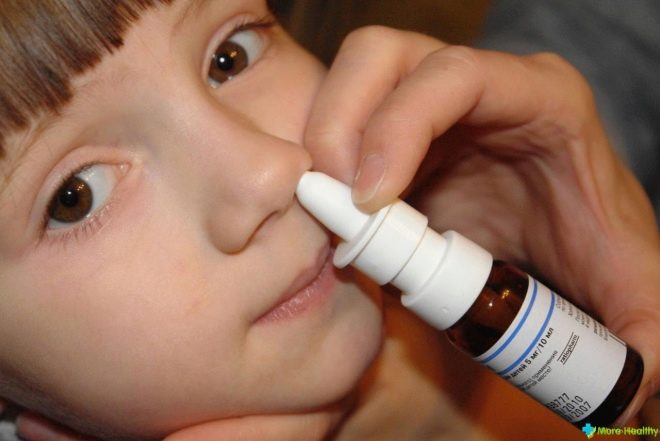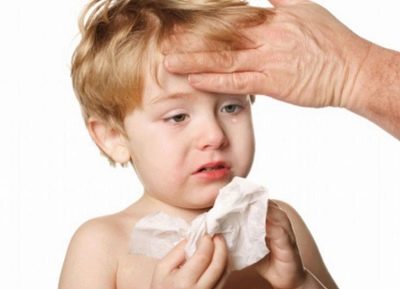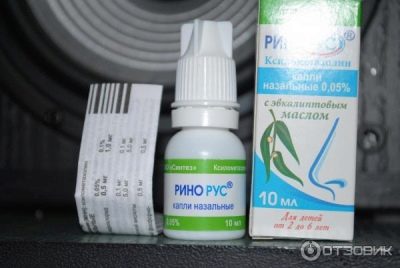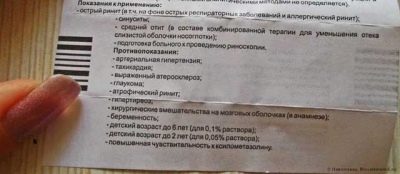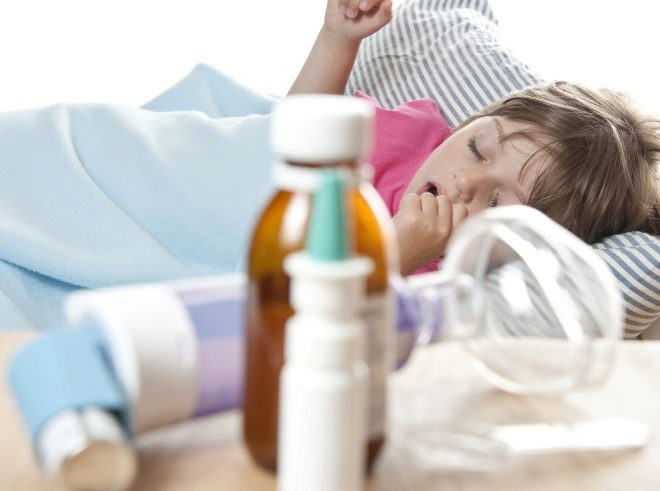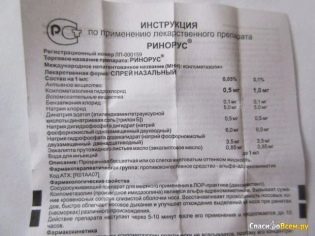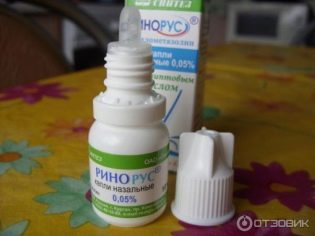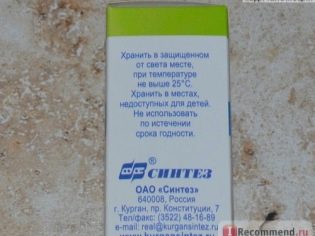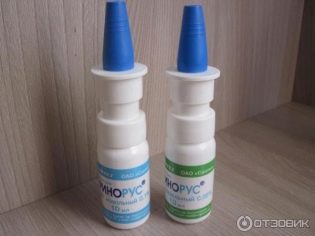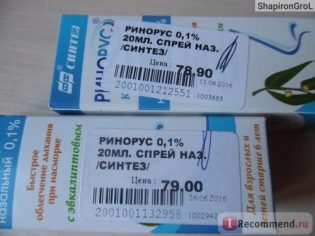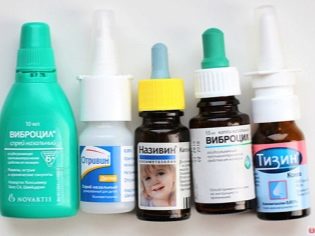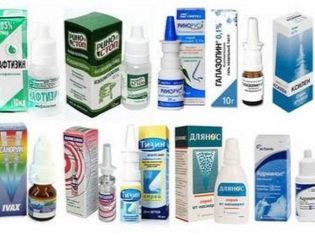Rhinorus for children: instructions for use
A runny nose accompanies almost every childhood cold, ARVI, or the flu. Nasal congestion gives children a lot of discomfort, and the little ones can even be dangerous. Therefore, a runny nose in children must be treated, but with drugs that are not only effective, but also safe.
Release form
"Renorus" is available in the form of nasal drops and spray. In both forms there are special children's dosages. For children, nasal drops or spray with an active ingredient content of 0.05% are used. Children over 6 years old and adults should use a dosage of 0.1%.
Sold the drug in bottles with droppers and dispensers.
Composition
Active component of "Corrosa" - xylometazoline hydrochloride, which is an alpha adrenostimulyator.
The composition of "Rinorus" also includes auxiliary substances: antiseptic benzalkonium chloride, common food salt - sodium chloride. In addition, the solution contains preservatives and stabilizers, ensuring its safety for the shelf life specified by the manufacturer.
Means is used in many medical solutions, including injection, as well as in the food industry.
The basis of the solution is distilled water. Eucalyptus oil has been added to Renorus, which softens the inflamed nasal mucosa, has an anti-inflammatory effect and a pleasant pine aroma.
Operating principle
In case of abundant nasal flow, vasoconstrictor preparations help to stop it. "Renorus", which is based on xylometazoline alpha-adrenostimulyator, narrows blood vessels, eliminates swelling and redness of the mucous membrane in the nose.
The medicine begins to act in just a few minutes after the injection, and the effect lasts for several hours.
Indications
Most often, nasal congestion is the first sign of a child’s illness. This may be a reaction to a viral infection, if the baby has contracted the flu or a respiratory viral infection, or a bacterial infection. Hypothermia in itself does not cause disease. But if the baby is cold, for example, while walking, then his immunity is reduced, which makes the body more vulnerable to infections.
Viruses and infections appear in the nose when inhaled and invade the cells of the nasal mucosa. The body, reacting to the invasion, at first sharply narrows the vessels, so there is a feeling of dryness, burning, and then the vessels dilate, the mucous reddens, inflamed. This leads to a narrowing of the nasal passages, difficulty breathing. There are nasal discharge.
Nasal drops or Rhinorus spray is used to treat various rhinitis, including allergic, pollinosis, as well as sinusitis - inflammation of the sinuses and along with other medicines for inflammation of the ear or the auditory tube.
"Rinorus" is used in preparation for manipulation or surgery on the nasopharynx.
Despite the prevalence in children, a runny nose can not be called a harmless disease. In young children, and especially in infants, when nasal breathing is difficult during sleep, hypoxia can occur - a lack of oxygen.
Children at an early age do not know how to breathe through their mouths, so parents need to closely monitor the baby’s breathing during sleep, and also take measures to treat a rhinitis.
From what age is prescribed?
Instructions for use "Renorus" contains age restrictions. Use the drug can only children older than 2 years. On the recommendation of a doctor, you can give the drug before 24 months.
Contraindications
Do not use "Renorus" if the child has a hypersensitivity to the active substance - xylometazoline. Contraindications include high blood pressure and tachycardia.
Not used "Renorus" with atrophic rhinitis. This drug is prescribed with caution if the child has diabetes.
Side effects
If you use "Rinorus" for a long time, the child may experience irritation, dry nose, sometimes there is a burning sensation, excessive sneezing, and in some cases even swelling of the mucous membrane. In addition, there may be vomiting, headache, poor sleep.
Therefore, it is necessary to take breaks between the courses of treatment of “Replacer”.
Instructions for use
Children from two to six years old are recommended to use a children's spray with an active ingredient content of 0.05% once or twice a day or drops of the same concentration of 1 or 2 drops in each nasal passage up to three times a day.
Children older than 6 years can also apply both drops and spray, but with a concentration of the active component of 0.1%.
Assign two to three drops up to 4 times a day, or one injection up to 3 times a day as needed. The course of treatment is from 3 to 5 days for drops and 5-7 days for the spray. As a rule, during this time the runny nose in a child goes away.
If the congestion persists, then the use of "Rinorus" should be stopped anyway and consult with your doctor about further treatment. In any case, a second course is appointed only after a few days.
Overdose
With an overdose of "Rinorus" in children, symptoms of side effects increase. There is swelling of the mucous membrane, vomiting, headache. The last symptom is associated with an increase in blood pressure due to vasoconstriction.
With a significant overdose, for example, If the child drank the contents of the bottle, you should immediately consult a doctor or call an ambulance.
Interaction with other drugs
If, simultaneously with the treatment of "Rinorus", monoamine oxidase inhibitors, which include some types of antidepressants or tricyclic antidepressants, are assigned to the child, you should notify your doctor. Such drugs are able to enhance the effect when interacting with "Renorus".
Terms of sale and storage
Drops and spray "Rinorus" refer to non-prescription drugs. It is necessary to store a bottle at air temperature not higher than 25С.
Reviews
Forums and websites dedicated to children's health, contain feedback from parents about the use of "Rinorus" for the treatment of rhinitis in children. Parents note several advantages of this drug, of which, first of all, they emit good efficacy.
If you begin treatment immediately after the appearance of nasal congestion, then literally 2-3 days after the application, the runny nose disappears without causing complications. Convenient dispenser, which provides a uniform injection, is another advantage. The low price of the drug makes it affordable: drops in Moscow can be bought at a price of 20 rubles, the spray costs about 60 rubles.
Dr. Komarovsky will explain in the video below when rhinitis really needs to be treated with vasoconstrictor agents.
Analogs
Among the drugs for the common cold, which include xylometazoline, in Russian pharmacies are “Xymelin», «Nazivin», «Rhinostop" other. These drugs are similar in action to "Rinorus." However, the effect of this drug is longer, therefore it can be applied only 2 or 3 times a day.
